Have you ever walked into a room and felt instantly calm or happier? Maybe it was the smell of lavender or peppermint that did it. These moments show us how essential oils can heal and uplift us.
These natural remedies offer powerful health benefits. They can improve our physical and emotional health. In this guide, we’ll explore the best essential oils for different needs. We’ll also learn how to use them for a better life1.
Key Takeaways
- Essential oils are concentrated plant extracts with numerous healing properties.
- We can use oils like lavender and peppermint for both emotional and physical health benefits.
- Knowing which essential oils to use for specific conditions can enhance our overall wellbeing.
- Incorporating essential oils into our daily routine can provide significant therapeutic advantages.
- Understanding how to use essential oils safely maximizes their health benefits for us.
What Are Essential Oils?
Essential oils are very concentrated extracts from plants. They capture the plant’s scent and flavor through methods like steam distillation and cold pressing. Each essential oil has its own unique chemical compounds. This makes them great for aromatherapy and other uses.
These plant extracts offer many health benefits. For example, lavender and bergamot oils can help you relax and reduce stress23.
In aromatherapy, we usually inhale essential oils or apply them to the skin. But, we must mix them with carrier oils for safe use on the skin. Oils like tea tree and peppermint are known for fighting off germs and aiding digestion42.
Yet, using essential oils the wrong way can cause problems. It might lead to skin irritation or rashes, which is a concern for kids4.
Benefits of Essential Oils
Essential oils offer many benefits for our health. Lavender oil is famous for easing stress, pain, and helping us sleep better5. It’s also been used in hospitals for cleaning5.
Tea tree oil is great for fighting acne and fungal infections5. But, it’s important to keep it away from kids and pets because it can be harmful5 and6.
Frankincense oil helps reduce inflammation and boosts mood5. It also helps us sleep better5. Peppermint oil can ease digestion and improve mood, making it good for stomach problems5.
Eucalyptus oil is great for relieving nasal congestion and pain5.
Lemon and lemongrass oils have antibacterial properties and may help with Alzheimer’s6. Orange oil can also reduce anxiety when inhaled6. These oils show how essential oils can improve our well-being.
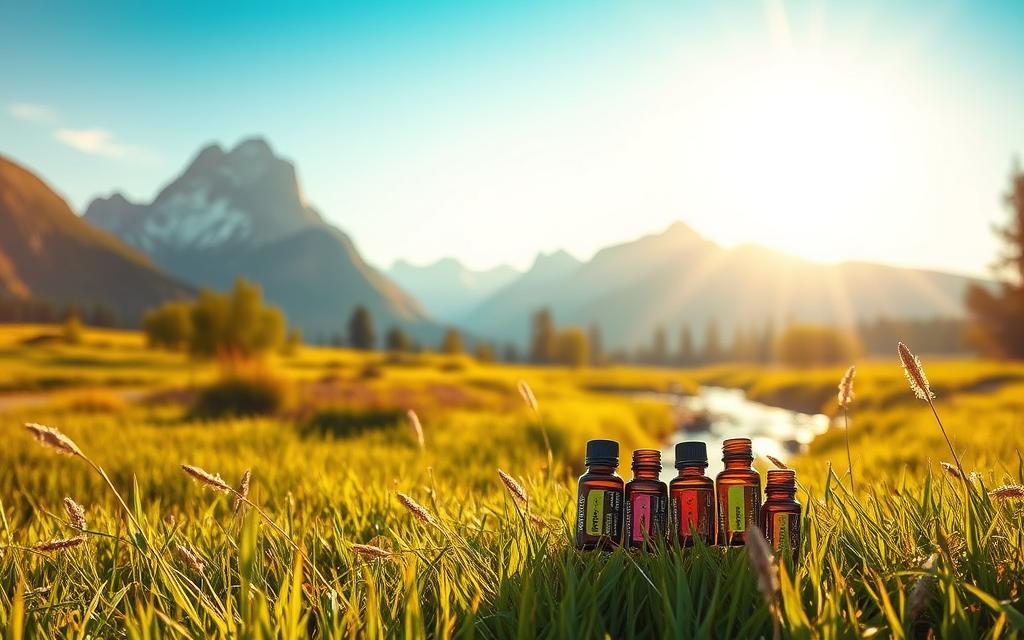
How Essential Oils Can Improve Your Health
Essential oils can greatly improve your health if used wisely. They help with headaches, sleep problems, and sore throats7. Lavender oil is great for calming and helping with sleep7. Tea tree oil is good for skin issues like acne and bug bites7.
Peppermint oil is a strong ally for digestive health, helping with IBS and headaches7. Lemon oil lifts our mood and improves emotional health7. Johns Hopkins research shows some oils, like oregano, can fight Lyme bacteria better than antibiotics7.
Cinnamon and cumin oils have big health benefits too. Cinnamon oil might protect against colitis, and cumin oil can lower blood pressure in people with metabolic syndrome8. Coriander and parsley oils boost antioxidants and fight inflammation, showing their wide-ranging benefits8. Essential oils offer a global arsenal for better health and wellbeing.
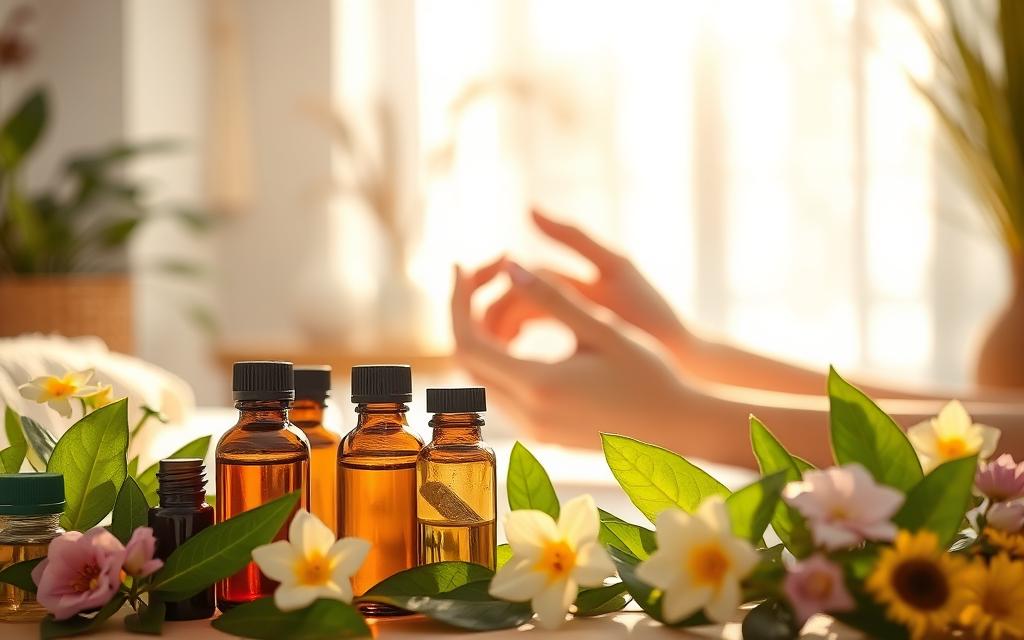
Essential Oils for Emotional Wellbeing
Aromatherapy is key for our emotional health. The right essential oils can greatly improve our mood. For example, lavender oil helps us relax, fight anxiety, and sleep better9. Frankincense oil also boosts our mood and helps us feel more at peace9.
Chamomile oil is great for those feeling anxious or depressed. It helps us relax and can even ease stomach problems9. Grapefruit oil is perfect for a mood lift, helping us feel more energetic, even when stressed or recovering from addiction9. Bergamot oil is also good for reducing anxiety and improving our emotional state9.
Ylang ylang oil is amazing for keeping our emotions stable and reducing stress9. Roman chamomile oil helps with depression and promotes relaxation9. Cedarwood oil helps us focus and reduces stress, which is good for our mental health9. Essential oils can affect our emotions, stress levels, and hormone balance by interacting with the limbic system9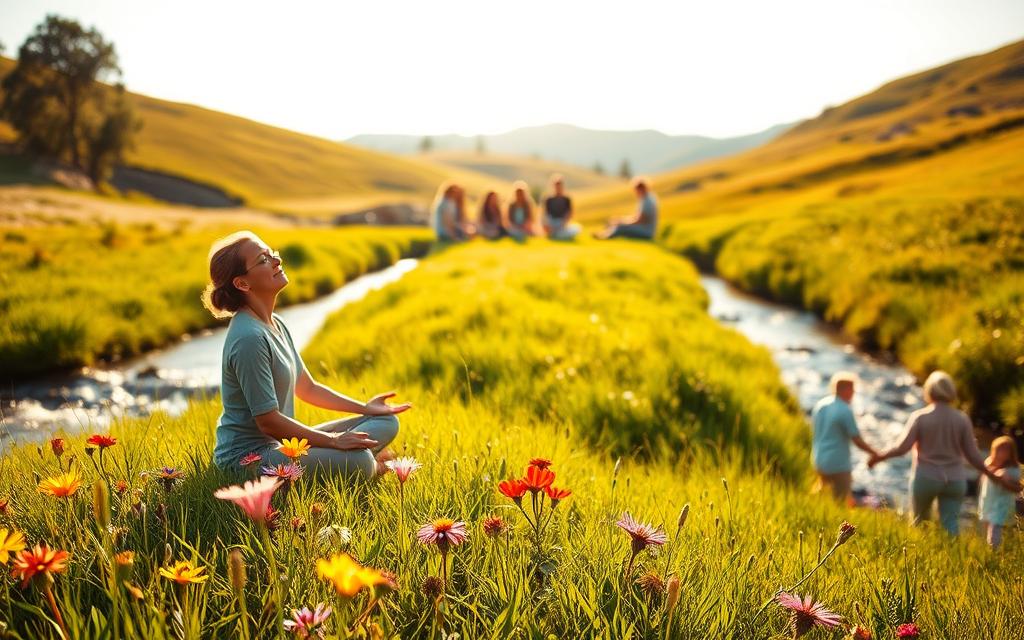
Other oils like peppermint and citrus fruits can also improve our mood and reduce anxiety10. Rosemary oil can make us sharper and improve our focus, helping us do better in school or work10. By using these essential oils, we can improve our emotional health and overall well-being.
Common Essential Oils and Their Uses
We have a wide range of popular essential oils, each with its own benefits. For example, Lavender is known for helping us relax and soothing skin problems11. Tea Tree oil is great for keeping the skin clean because of its antiseptic properties12. Peppermint oil is excellent for easing headaches and helping with breathing11. On the other hand, Eucalyptus oil is a top choice for breathing issues, like during colds13.
Let’s take a closer look at some common essential oils and what they can do:
| Essential Oil | Description | Specific Benefits |
|---|---|---|
| Lavender | Floral and herbaceous aroma | Promotes relaxation, aids in restful sleep, soothes skin irritations13. |
| Tea Tree | Sharp, camphor-like aroma | Antiseptic properties, skin cleansing, supports immune health12. |
| Peppermint | Fresh and invigorating | Helps with headaches, digestive comfort, and respiratory support11. |
| Eucalyptus | Fresh, camphoraceous aroma | Aids respiratory health, reduces tension, supports the immune system13. |
| Geranium | Floral, sweet, minty aroma | Balances skin moisture, supports emotional well-being12. |
| Ylang Ylang | Floral and exotic aroma | Promotes hair health, reduces tension, supports emotional wellness11. |
Using these oils can really improve our health and wellbeing. Each oil is good for different things, so we can pick the right one for our needs and goals.
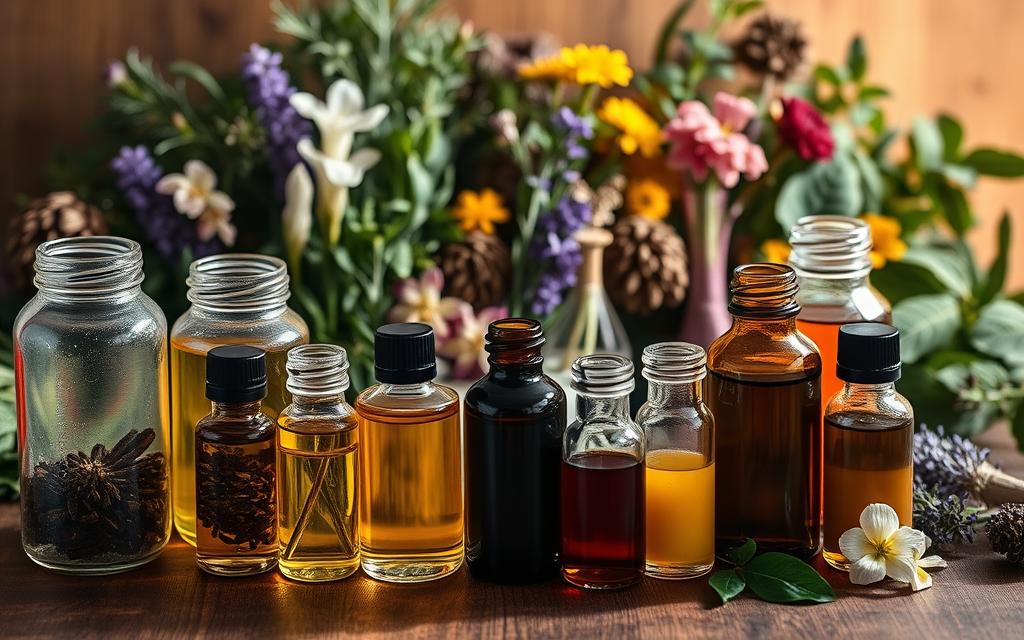
Essential Oils for Skin and Beauty
Adding essential oils to our skincare with essential oils routine brings many beauty benefits. Lavender oil calms the skin and keeps it hydrated, reducing irritation14. Frankincense oil helps fight aging signs, making the skin look younger14. Tea tree oil is great for acne-prone skin, acting as a natural antiseptic14.
Using essential oils safely means mixing them with carrier oils for topical use15. We can mix these oils into homemade skincare items like masks and scrubs15. This way, the oils work better together15. There are also special blends for different skin types, with carrier oil suggestions15.
Helichrysum italicum oil helps with skin healing and scar reduction14. Geranium oil balances oily skin and makes it look younger14. Neroli oil fights aging, boosts mood, and improves skin tone14.
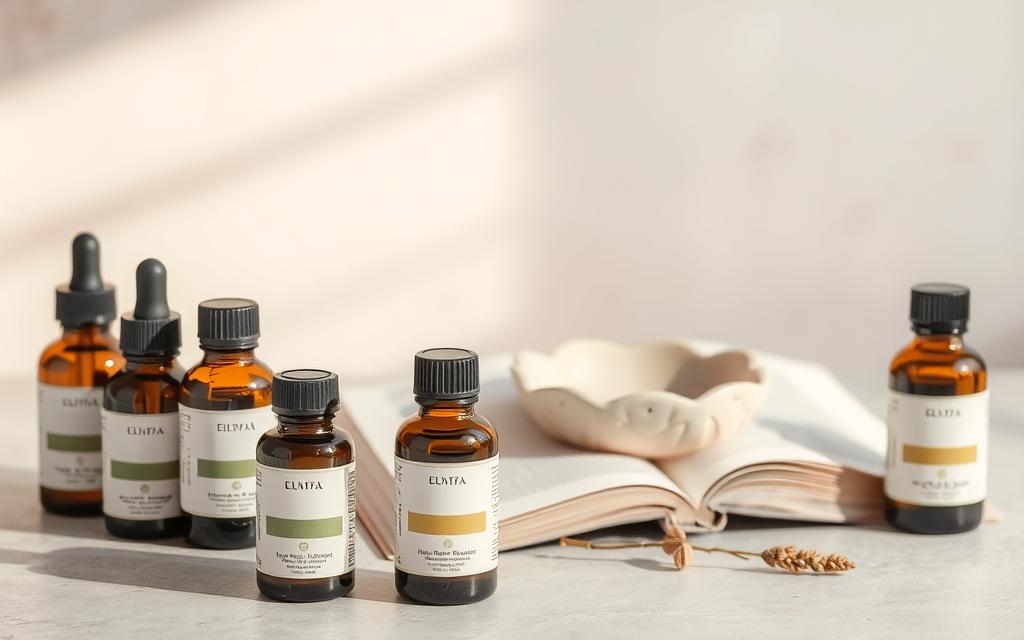
How to Use Essential Oils Safely
Using essential oils can be a delightful experience, but it’s important to use them safely. These oils are very concentrated, being 50-100 times stronger than the plant they come from16. To avoid skin reactions, it’s key to dilute them properly before applying16. A good rule of thumb is to mix 1% to 5% essential oil with a carrier oil like coconut or jojoba17. Always do a patch test on a small area first17.
Some essential oils are not safe for young children, like birch and wintergreen, because they contain methyl salicylate17. Keeping these oils out of children’s reach is crucial to prevent accidents17. It’s also wise to talk to a healthcare professional before using them, if you have health issues or are on medication17. Also, never apply undiluted essential oils to damaged skin, as it can make irritation worse17.
It’s also important to check the essential oils regularly for any changes in appearance, smell, or texture17. Certain oils, like tea tree oil, can be good for treating infections if used correctly17. When adding essential oils to baths, make sure they are fully mixed in to avoid irritation16.
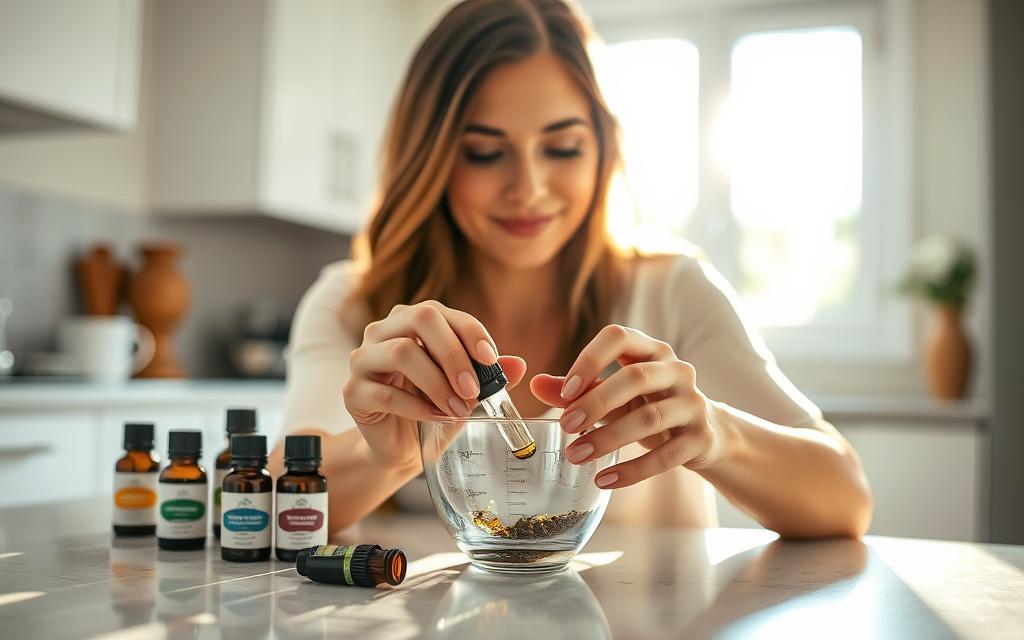
| Essential Oil | Recommended Dilution | Precaution |
|---|---|---|
| Tea Tree Oil | 1% – 5% | Avoid contact with eyes |
| Lemongrass | 1% – 3% | Patch test recommended |
| Cinnamon Bark | 1% – 5% | Can cause skin irritation |
| Birch | Avoid for children under 6 | Contains methyl salicylate |
By following these essential oil safety tips, we can enjoy their benefits while staying safe.
Creating Your Own Essential Oil Blends
Making your own essential oil blends is a fun way to create scents you love. First, pick essential oils with different smells like flowers, woods, and citrus. You’ll also need small glass bottles and droppers18.
Start with 10 drops of oil. This makes it easy to figure out the right mix19. A good blend has 30% top notes, 50% middle notes, and 20% base notes. This mix can really improve how your blend smells19.
Choose oils you know well. Lavender and chamomile are calming, while eucalyptus and lemon are refreshing and good for breathing20. Try your blend on perfume blotters or cotton balls to see how it smells. Let it sit for a day to blend the scents better19.
Think about what you want your blend to do before mixing oils. This helps you pick the right oils for your needs. This way, your blend will not only smell great but also work well20.
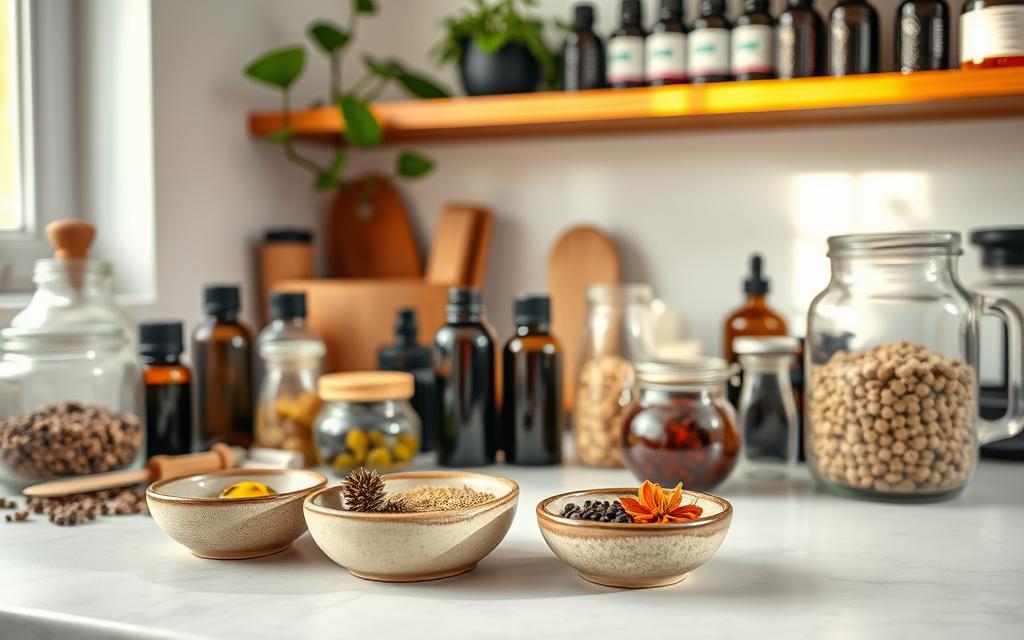
Top Essential Oils for Specific Conditions
Some essential oils are better than others for certain health issues. For example, lavender oil is great for skin problems, stress, and better sleep. It also helps with inflammation and healing wounds21. Eucalyptus oil is good for colds, flu, and breathing issues21. It also cuts down on mucus, perfect for cold season21.
Peppermint oil is great for stomach problems. It relieves bloating and headaches, and feels cool21. It’s also good for breathing and bad breath22. Tea tree oil is excellent for skin issues like infections21.
Bergamot oil is great for stress and mental health. It’s an antidepressant and helps with digestion22. Clary sage is also good for stress and sadness22. Knowing how to use these oils can really help us.
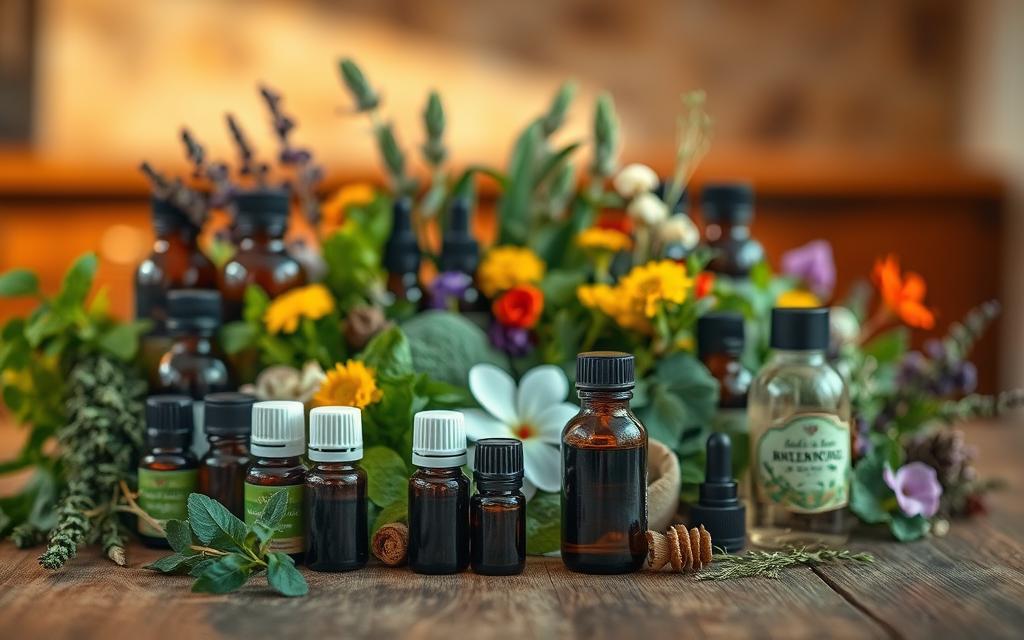
Using an Essential Oil Diffuser
An essential oil diffuser spreads the scents of oils like lavender and peppermint into the air. This makes our space smell better and can help us feel less stressed23. The oils interact with our brain, affecting our mood and emotions23.
There are many ways to use a diffuser. Some use fans, while others heat up the oils to release their smell24. There are also diffusers that make a mist without heat, keeping the oils’ benefits24. Another type uses sound waves to create a mist, which is good for the environment24.
To get the most out of our diffuser, we should choose high-quality oils. Look for ones that are cold-pressed or steam-distilled23. We should follow the instructions for how much oil to use and keep our diffuser clean23. It’s also important to be careful, like talking to a doctor before using it if we have allergies or are pregnant23.
Organic Essential Oils: Are They Worth It?
Exploring organic essential oils, we often talk about their purity and benefits. These oils come from plants grown without harmful chemicals. This might make them more effective for health25. Choosing organic helps us avoid harmful substances, fitting our health goals26.
Organic essential oils cost more, 20-70% than regular ones. But, is it worth it? Many believe yes, because organic farming is better for the earth. It keeps soil healthy and uses fewer chemicals26. Also, good certifications like QAI ensure quality and honesty in making these oils26.
Even though organic oils have less pesticide, some might still be present26. Companies like ACHS and The Apothecary Shoppe promise no pesticides in their products. This makes us trust the purity of what we buy25. So, choosing organic oils supports our health and the planet.
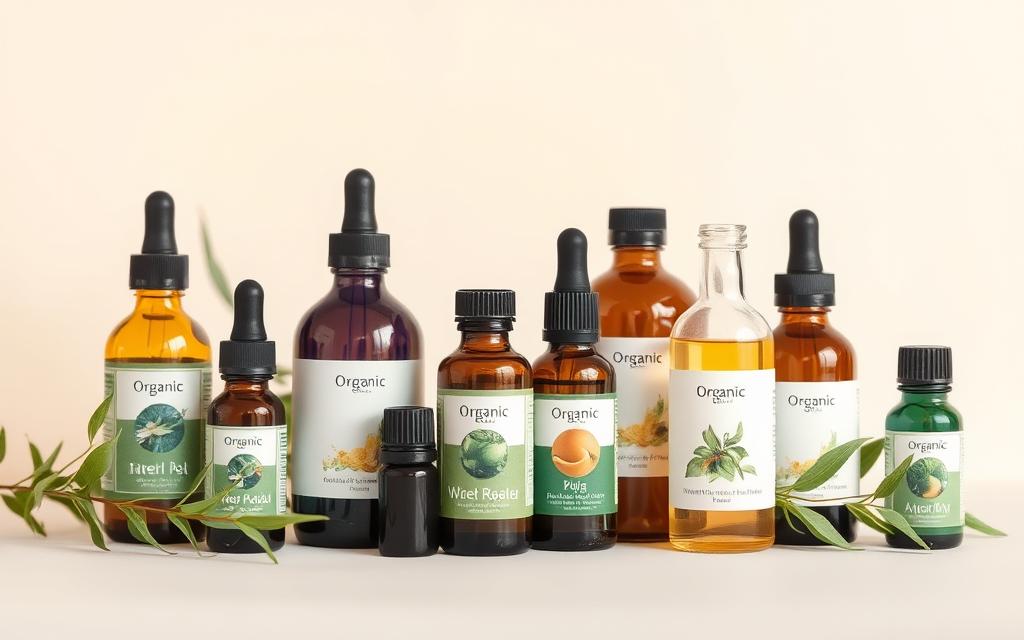
Essential Oil Recipes for Everyday Use
Adding essential oils to our daily lives can boost our wellness. We can make simple DIY blends for different needs. For example, a mix of 4 drops of lavender oil, 3 drops of bergamot oil, and 2 drops of cedarwood oil can create a calming atmosphere for bedtime27.
For better digestion, try mixing 3 drops of peppermint oil with 2 drops of lemon essential oil28. Making lavender bath salts can turn our baths into a relaxing escape.
Essential oils can help with many everyday issues. For better breathing, blend 2 drops each of peppermint, lavender, and lemon essential oils. This is great for refreshing our space in spring and summer28.
In winter, a respiratory boost can be made with 2 drops of peppermint oil and one drop each of lemon, eucalyptus, and rosemary oils28.
We can also use oils to get rid of bad smells at home. A nice blend could be 2 drops of grapefruit oil, 2 drops of cedarwood oil, and 2 drops of lavender essential oil. This mix creates a fresh scent28.
These essential oil recipes are not only fun to make but also practical. They offer natural solutions to our daily problems.
Conclusion
Essential oils are a treasure trove of health benefits, going beyond just smell. They contain powerful compounds like Monoterpenes and Phenols. These make them more effective than the plants they come from29.
Choosing high-quality essential oils is key. Look for ones with “Canada Organic” or “USDA Certified” labels. This ensures they are safe and effective for our health29.
Storing essential oils correctly is also important. Keep them in cool, dry places to keep their benefits strong29. Using essential oils daily can improve our mood and health. Lavender calms us, while tea tree fights germs30.
But safety comes first. Always dilute them correctly and do patch tests to avoid any issues30.
Essential oils have a long history of use in health and spirituality. They offer a promising way to heal holistically in today’s world29. By using them wisely, we can greatly improve our lives. They truly belong in the world of health and wellness31.
FAQ
What are the best essential oils for stress relief?
Lavender, chamomile, and sweet orange are top picks for stress relief. They calm the mind and body. Use them in aromatherapy or mix into skincare for relaxation.
How can we safely use essential oils on our skin?
Mix essential oils with a carrier oil like coconut or jojoba. This prevents skin irritation. Just a few drops are enough for good results.
Can essential oils really help with sleep?
Yes, lavender oil is great for sleep. It creates a calm atmosphere. This helps your body relax and sleep better.
What are some easy essential oil recipes for home use?
Try lavender bath salts for relaxation, peppermint oil for stomach issues, and lemon sprays for cleaning. These recipes boost health and make home feel cozy.
Are there specific essential oils we can use for respiratory issues?
Eucalyptus oil is excellent for breathing, helping with colds. Mix it with peppermint for even better results.
What makes organic essential oils different from conventional ones?
Organic oils come from plants grown without harmful chemicals. They are purer and may work better, making them a top choice.
How do essential oil diffusers work?
Diffusers spread essential oils through the air. Enjoy their scents and benefits everywhere. Always follow the diffuser’s oil-to-water ratio for best results.
Source Links
- The 15 Best Essential Oils for Total Healing – https://www.herbcottage.com.au/blogs/aromatherapy/most-popular-essential-oils?srsltid=AfmBOopV4B28IAOP5X1CO0tztchVwAJG9b8X7W83TUfTEBwQOoHA9BHG
- What Are Essential Oils, and Do They Work? – https://www.healthline.com/nutrition/what-are-essential-oils
- Essential Oils Benefits and Uses Chart – https://www.performancehealth.com/articles/essential-oils-benefits-and-uses-chart?srsltid=AfmBOormKbIgYOjPDf22TpO7z0o4_M3vYMBMLb8ffaDCy0hzlarmopDO
- Essential oil – https://en.wikipedia.org/wiki/Essential_oil
- 11 Essential Oils: Their Benefits and How To Use Them – https://health.clevelandclinic.org/essential-oils-101-do-they-work-how-do-you-use-them
- Health Benefits of Essential Oils – https://www.webmd.com/diet/health-benefits-essential-oils
- Aromatherapy: Do Essential Oils Really Work? – https://www.hopkinsmedicine.org/health/wellness-and-prevention/aromatherapy-do-essential-oils-really-work
- Essential oils: a systematic review on revolutionizing health, nutrition, and omics for optimal well-being – https://pmc.ncbi.nlm.nih.gov/articles/PMC10905622/
- Essential Oils for Mental Health | Solara Mental Health – https://solaramentalhealth.com/in-residence-care/holistic-therapy/essential-oils/
- Essential Oils for Emotional Wellbeing – https://nikura.com/blogs/living-well/essential-oils-for-emotional-wellbeing
- The Master List of Essential Oils | doTERRA Essential Oils – https://www.doterra.com/US/en/blog/spotlight-master-list-of-essential-oils
- Essential Oils List – Benefits and Uses Chart – Range Products – https://www.rangeproducts.com.au/resources/essential-oils/benefits-and-uses-chart/?srsltid=AfmBOoppcJKPif-pCfk4KPVMbJ0UB3-WAeIhKTlufDi688AdlU0nFaw0
- Essential Oils Benefits and Uses Chart – https://www.performancehealth.com/articles/essential-oils-benefits-and-uses-chart?srsltid=AfmBOor_LzXyzcRHxj6HCIiA4PrE2-xQ201kpnLm0fK3cnyUExXU7hFL
- Essential Oils for Skin Care | Natural Way To Promote Healthy Skin | Essential Skin Care – https://www.rockymountainoils.com/collections/skin-care?srsltid=AfmBOopQZyVr3vSjCXVY03_TGFksKj_yY0gLqY-zh8kWCX9qzak7RL1b
- A COMPLETE GUIDE TO ESSENTIAL OILS FOR SKIN – https://www.newdirectionsaromatics.com/blog/a-complete-guide-to-essential-oils-for-skin/
- Safety Guidelines – Tisserand Institute – https://tisserandinstitute.org/safety-guidelines/
- Dos and Don’ts of Essential Oils – https://www.webmd.com/skin-problems-and-treatments/ss/slideshow-essential-oils
- The Art and Science of Blending Essential Oils – https://blog.mountainroseherbs.com/how-to-blend-essential-oils
- How to create your own essential oil blend – https://www.natio.com.au/blogs/discoveries/how-to-create-your-own-essential-oil-blend
- Blending Essential Oils For Beginners | Growing Up Herbal – https://growingupherbal.com/blending-essential-oils-for-beginners/
- The 15 Best Essential Oils for Total Healing – https://www.herbcottage.com.au/blogs/aromatherapy/most-popular-essential-oils?srsltid=AfmBOoo3-vw3wnCERRNyIfEJ7saKZ_9Jvd6FlK67uaDab_XrEQR21vLN
- Top 10 Essential Oils and How to use them – https://www.revive-eo.com/top-10-starter-essential-oils/?srsltid=AfmBOoo0eE4gacsjLX-S5XAoTRZjnMbUIfDPFlSqdjoK5A2T8Gkl0aL1
- What To Know About How To Use an Essential Oil Diffuser – https://www.health.com/condition/stress/essential-oil-mistakes
- How Do Essential Oil Diffusers Work? – https://volantaroma.com/blogs/guides/how-do-essential-oil-diffusers-work
- Are Pesticide-Free Organic Essential Oils Truly Worth the Splurge? | American College of Healthcare Sciences – https://achs.edu/blog/are-organic-essential-oils-worth-the-splurge/
- ORGANIC VS. NON-ORGANIC ESSENTIAL OILS: A DETAILED BREAKDOWN – https://www.newdirectionsaromatics.com/blog/organic-vs-non-organic-essential-oils-a-detailed-breakdown/
- Essential oil diffuser recipes—for every mood – https://www.youngliving.com/blog/essential-oil-diffuser-recipe-blends/?srsltid=AfmBOoq6jaiS1xWC7-ohkNkNOu7U66-eAtat-QBJUJV4t5H_7GBQc_4T
- Essential Oil Recipes for Diffuser – Blends for Every Occasion – https://www.smellacloud.co.uk/blogs/news/essential-oil-recipes-for-diffuser-blends-for-every-occasion
- ABOUT ESSENTIAL OILS – https://www.newdirectionsaromatics.com/blog/about-essential-oils/
- Conclusion on essential oils – https://punchng.com/conclusion-on-essential-oils/
- Essential Oils – https://www.niehs.nih.gov/health/topics/agents/essential-oils
